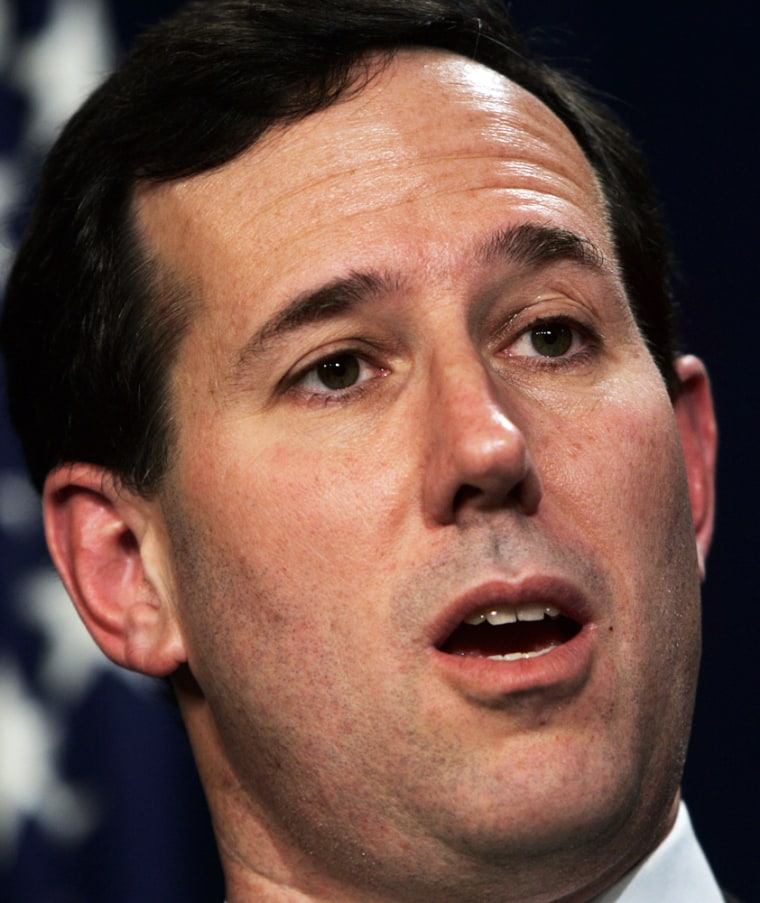After hearing Sen. Rick Santorum, R–Pa., make his pitch at a town hall meeting on Social Security at Bucknell University in Lewisburg, Pa. Wednesday, retiree Gerald Powers, one of Santorum’s constituents, posed a common-sense question about political self-preservation.
Why is Santorum, who is up for re-election next year, so insistently arguing the case for private accounts and aiming his pitch at younger people, despite the fact that it’s older people who vote in greater numbers, and who are more skittish about changes in the system?
Santorum repeatedly told a crowd of about 400 people, half of them Bucknell students, that people over age 55 had nothing to fear from Republican proposals for private retirement accounts within Social Security.
As Powers noticed, much of Santorum’s pitch was targeted at younger people.
“Why do I go to college campuses?” Santorum asked. “Because guess who’s going to get stuck with the bill” for the retirement benefits promised to today’s Baby Boomers.
Pitching to young males
“Any 20-year old males in here?” Santorum asked. “Young man, why don’t you stand up?” A Bucknell male named Ted bravely stood up and became Santorum’s Average Young Guy, with dim prospects for getting decent treatment from Social Security.
According to Santorum, “Average Ted” or any other average male his age will pay $411,336 in Social Security taxes over his lifetime and get a rate of return of only 0.9 percent when his retirement benefit is paid to him many decades from now.
“He won’t get his money back,” Santorum declared. “Ted’s not going to get back near what he paid into the system.”
Earlier Santorum had assured the age 55 and older folks in the crowd, “If you’re at or near retirement, we’re not going to have to change benefits for you, or raise taxes.”
Using slides on a giant screen, Santorum did a skillful job at presenting the issues of fertility rates, index funds, rates of return on investments, and administrative overhead.
But the crowd didn’t stand up and cheer, and it wasn’t just due to the skepticism of Democratic voters such as Nancy Schott, a financial planner from Bloomsburg, Pa. and a John Kerry 2004 supporter, who screwed up her face in tart disbelief throughout Santorum’s presentation.
Fee estimates too low?
“He had some really low fee numbers there, phenomenally low,” Schott said afterward, arguing that administering a private account system will be more expensive than Santorum says.
It was the interlocking complexity of the entitlement issues that made the presentation far harder for listeners to swallow than the chicken cutlet lunch they had just eaten.
As Powers asked the senator during a feisty question-and-answer period after his speech, why wasn’t Santorum addressing the funding shortfall in Medicare, the health insurance system for people over 65?
Santorum admitted that Congress in fact made Medicare finances worse, not better, 18 months ago when it enacted an immensely expensive prescription drug benefit as part of Medicare.
But Santorum spent most of his energy Wednesday evangelizing for an overhaul of Social Security.
“I guarantee you: if Franklin Roosevelt were alive today, and he was looking at these demographics, there is no way he would propose the current Social Security system,” Santorum insisted, explaining the demographic crunch that will soon face the United States and Europe.
“We’re down now under two children per woman,” he said. “If we look anything like Europe is looking — and we have trends that tend to lag behind Europe — Western Europe is at 1.5, Spain is at 1.2. These countries are dying; these countries are depopulating themselves, and but for immigration, we’re depopulating ourselves, too.”
Santorum argued that entitlement spending for people over 65 was going to “just eat up the entire federal budget in 50 years.”
No will to cut spending
And he argued that Congress lacks the will to do anything about it. For example, he said, last week, the Senate refused to approve the modest cut in Medicaid outlays that Bush wanted.
“The Medicaid budget over the next five years is going to grow by 40 percent. The president only wanted it to grow by 39 percent,” he said. “A reduction of only one percent in the rate of growth in Medicaid and we couldn’t pass it in the United States Senate!”
The audience’s questions were tough and skeptical.
“Why not just increase the retirement age?” asked one man.
Santorum replied, “I talked about at LaSalle University back in 1994 and almost lost an election because of this ... I dropped about 20 points in the polls in three days.”
The questioner fired back with an adversarial question over the cost of administering private accounts. “Big overhead,” the man told Santorum.
'You weren't listening'
“Well, I think I addressed that issue,” Santorum answered. “Maybe you weren’t listening. Thirty basis points is not big overhead.”
For a moment it was the old Rick Santorum on display, the firebrand, elected to the House in 1990, and always ready to spar, even with his own constituents.
In next year’s election both Social Security and the Santorum persona will be on the ballot in Pennsylvania.
It is certain to be one of the closest Senate races in the country as he battles Democrat Bob Casey, Jr. The latest survey issued Tuesday by Terry Madonna’s Keystone Poll at Franklin & Marshall College showed a statistical tie between Casey and Santorum, with 13 percent undecided.
For Republican strategists, the poll provided unsettling data on some voters’ dissatisfaction with Santorum: 46 percent of those interviewed said he was doing a fair or poor job as senator, compared to 40 percent who said he was doing a good or excellent job. Another 14 percent didn't know what kind of job he was doing.
